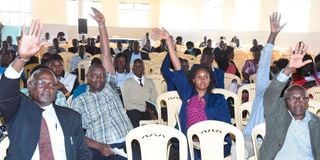Why parents want primary schools to host junior high

Attendees draw the attention of Prof David Some who chaired a meeting of the education reforms task force held at Uasin Gishu High School in Eldoret town on November 11, 2022.
The structure of the competency-based curriculum (CBC) could be decided as early as in two weeks and potentially mark another major policy reversal by the Kenya Kwanza Alliance administration.
An analysis by the Nation of presentations made at various venues before the Presidential Working Party on Education Reforms (PWPER) indicates that the domiciling of junior secondary schools (JSS) is a running concern.
Although opinion is split over the issue, there appears to be a strong push to reverse the Jubilee administration's decision of domiciling it in secondary schools.
It is also not lost on observers that the momentum by the previous administration to prepare secondary schools to receive the pioneer CBC class has been slowed down. Particularly, the project to build extra classrooms has slowed down, apart from the completion of those contracted under the previous regime.
President William Ruto will receive a preliminary report from the reforms team at the end of the month, after which he is expected to announce to the country how learners will transition to JSS in January next year.
Under the CBC framework, JSS comprises Grades 7, 8 and 9, after which learners proceed to senior secondary (Grades 10, 11 and 12).
Domiciling JSS in primary schools will pose a challenge for the government because primary school teachers are not trained to teach secondary school content. It would also go against the original thinking behind creating two secondary school segments.
Adopt report
On Friday last week, Deputy President Rigathi Gachagua said the government would adopt the report with Kenyans’ views without altering “a comma or a full stop”.
Although the team has six months to write the final report, it is expected to give progress reports at the end of November and January.
The President will receive the initial recommendations in the same week that 1,287,597 learners in the pioneer CBC class will undertake the inaugural Kenya Primary School Education Assessment.
Unlike their 1,244,188 counterparts in Standard 8 who will be sitting the Kenya Certificate of Primary Education examinations sure they will be in secondary school come January, the Grade 6 learners do not know whether they will remain in their current schools or move to secondary institutions.
“The exams are starting on November 28 and a major announcement concerning this (transition) will be made in December, either when I am announcing the examinations results of Grade 6 or before that, the President will have known what the desires of Kenyans are and make a pronouncement,” said Education Cabinet Secretary Ezekiel Machogu.
The cost of implementing CBC, teacher preparedness and infrastructure are the other main points of contention.
Debate on the CBC dominated the public sessions that ended on Friday last week, despite constant reminders that the mandate of the PWPER covers the whole education sector. This week, the team will listen to submissions from various institutions, organisations and unions in education.
“In regard to the transition to junior secondary school, parents feel that the Grade 6 (learners) are (too) young to transit to boarding schools together with the senior learners. Domicile JSS in primary school with different uniforms, teachers and administrators,” said Mr Jasper Omwenga, the chairperson of the National Parents Association, Nairobi County, when he made a presentation before the team at the University of Nairobi on Friday.
Knut push
The Kenya National Union of Teachers will appear before the PWPER tomorrow. Secretary-General Collins Oyuu told the Nation that the union will push for JSS to be in primary schools.
“It’s not logical to have it in secondary school. The classrooms that were meant to hold Grades 7, 8 and 9 are already occupied because of congestion. There’s total congestion even in day schools,” Mr Oyuu said.
However, the secretary-general of the Kenya Union of Post-Primary Education Teachers (Kuppet) rubbished the idea as a “pedestrian argument”. According to him, JSS involves the introduction of new study areas that cannot be taught by primary school teachers.
“We’ll only be suspending a problem. Let’s confront it and be creative. Education financing is the elephant in the room,” he said. Kuppet will also make its recommendations on Wednesday.
A memorandum by the National Association of Private Universities in Kenya, at a sitting at Chania High School in Kiambu County, also supported the domiciling of JSS in primary school.
“Other than the tender age of the candidates transiting into JSS, it is doubtful that there is adequate infrastructure to accommodate them in the current secondary schools given the anticipated 100 per cent transition of Standard 8 pupils to Form One. It is most prudent and reasonable to domicile JSS in primary schools,” the memorandum signed by Dr Vincent G Gaitho, the secretary-general, reads.
Prof Romanus Odhiambo, the vice-chancellor of Meru University of Science and Technology told the reforms team that with most parents appearing to prefer JSS being domiciled in primary or day schools, the management of the two should be separate.
“Administrative structures should be created so that teachers manning the secondary section are different from those at the primary level to ensure professionalism,” he said.
Kakamega County Deputy Governor Ayub Savula also supported the domiciling of JSS in primary schools.
A task force that had been appointed by former Education CS George Magoha had ruled out having JSS in primary schools saying they lack both human resources and infrastructure (especially for sciences) to facilitate the depth of engagement with CBC content.





